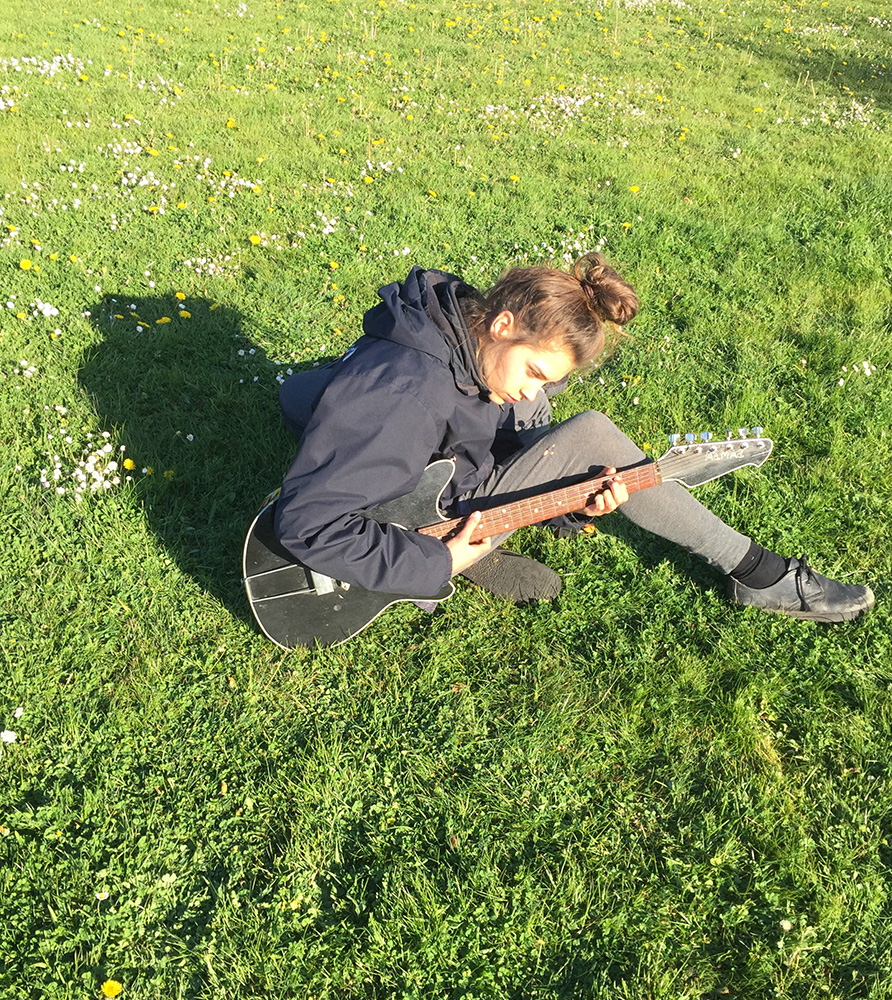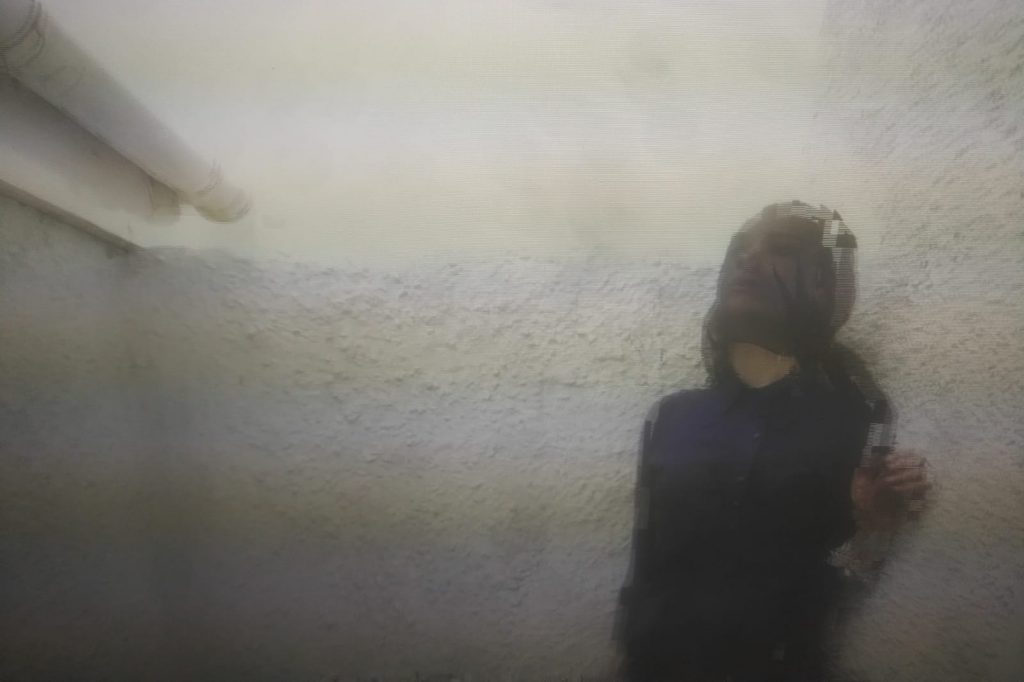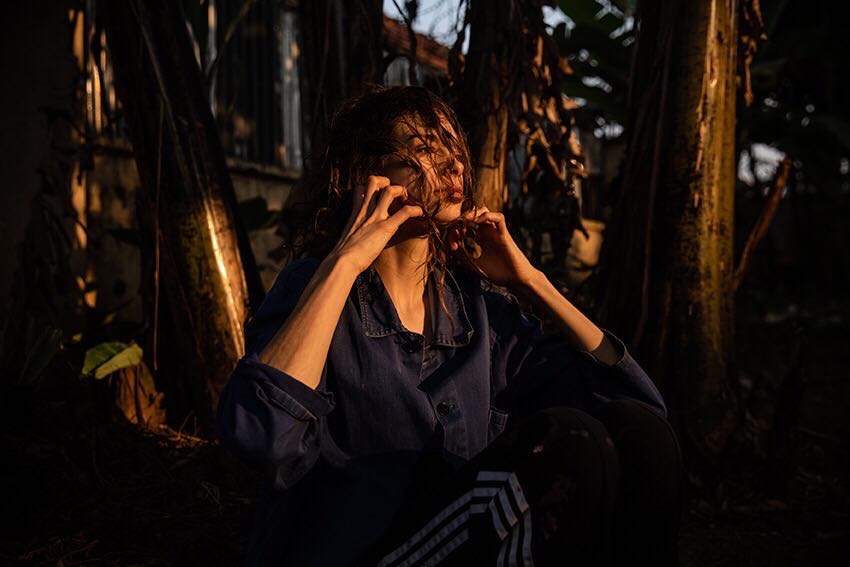“I remember the first time we performed live, I felt like I had committed an obscenity. I remember feeling like I’d just been sick out my head on stage. Vernacular vomit,” writes Elvin Brandhi over email, responding to a question on the animated use of vocals in her music. “The illusion of separating yourself from your thoughts, pouring them out the head [in order to] free the head… giving it room to think?”

We are emailing in the lead up to tomorrow’s release of AQNB’s even my dreams don’t go outside compendium, for which Elvin Brandhi contributes the frenetic vocalisations of her new track ‘Wifi ft. Melody,’ premiering on the site today. Elvin has performed visceral improvised music extensively as one half of father-daughter duo Yeah You, releasing on the likes of Opal Tapes, Alter and more. Her solo work is rife with a feeling of physicality meeting its dissolution through technology. In her 2019 release Shelf Life for C.A.N.V.A.S., erratic vocal streams of consciousness accompany densely atmospheric sounds of digital neurosis. The EP is coupled with an ambiguous press text that, read now, has oddly prescient echoes of the coming 2020 pandemic: “The supermarket social network obliterates the surface of material hybridising, detaining all movement to self enclosed unit reductions”.
Elvin’s hyper-awareness of both embodiment and digital media in her work makes her a keen commentator on the situation under COVID-19 lockdown. “‘Live’ music is not just about connecting with a real performer but with a group of living bodies, the spectacle isn’t everything,” Elvin notes on the topic. “A lot of producers feel it is the audience who embody the music, make it live, in their real psycho-somatic experience of it.” This sentiment was explored last month in Yeah You’s live stream for Cafe OTO, where the duo took to motorways recording roadside improvisations, an ongoing practice of theirs. In the midst of the pandemic, these performances capture perfectly the alone together isolationism of the present.
Communicating over email with Elvin is a fitting platform considering her knack for lyricism along with her consciousness of technological disembodiment. We chat topics spanning the voice, internet aesthetics, improvisation and the “silicon” separating audiences of livestreams.
** One of the most memorable live streams I’ve seen recently was the Yeah You roadside performances you did for Cafe OTO. Footage of the motorway, people separated by their cars; it really captured the anxiety of our rewritten relationship with the urban environment during the pandemic. Do you have any thoughts on broadcast media and how it can be toyed with in new ways at the moment under lockdown?
Elvin Brandhi: Doing the car sessions is for us a very normal part of day-to-day life, but the circumstances of the live stream changed the dynamic completely. The idea of this becoming a performance at Cafe OTO! (Which, because of the intimacy of the space, is always a really intense socially engaged experience.) I felt like we were grappling for what it would have been, upping the theatre, lapping ourselves, overflowing through the camera into screens. I felt the silicon separating the audience and our performance to be a provocative intrusion, but a necessary one, like an antiseptic sting. It was a barbaric attempt at being real for a virtual platform.
** The voice is a really loaded instrument, it has so many narrative and cultural connotations. How do you approach the way you use your voice and what it does stylistically for your tracks?
EB: I do not associate the drive to vociferate with a desire to sing, I’ve never remembered thinking I could sing. I approach it via linguistic kinetics; reap the voice as the substance of subjectivity, an immaterial organ. In Yeah You I try to shout the words out of the head, spit language out, an impossible attempt to empty the head of cognitive baggage. Sounding-out, in an impulse to oust oneself out of yourself. In my production I often use my voice as a sampler, synth, or hit, in a much more disguised and un-personified way.

** How has your improvisation practice with your father in Yeah You informed how you go about your work as a solo artist?
EB: The improvising DIY impulse definitely applies to the way I use samples, my resourcefulness and collage approach. I’m pretty chaotic, because even in compositions I’m usually trying to capture what seems like a fleeting sentiment. I always thought I’d be an author when I was young. Writing music is definitely more in the plot, character or world-weaving realm, but sound communicates beyond embedded logic, un-inhibited by semiotic connotations. Then Yeah You is wallowing in words. I think I satisfy the narrative-impulse via these two poles.
** Where do lyrics fit into your process, or how do you approach your practice and inspirations as a writer?
EB: It’s funny because I find it really hard to sing on any of my own beats, I know them too well, so when I come to sing, I’m too conscious. I never write lyrics that I sing. The key to my lyrical flow is NOT THINKING!
The rant-antic, screamo-essay style, rummaging through cognitive baggage, personifying dogmas, ideological extremes, exorcising imperatives, personifying concepts and ideologies… improvising maxims, truisms, improverb-ising! Like a Quack doctor or joker, whose truth is momentum more than the content. I remember someone once asking “who is she so angry with?” I don’t really see it as anger, it’s a kind of aesthetics of insistence, defiance of apathy.

** Your sound palette sits quite well among some internet native electronic music — experimental producers playing with club textures but not restricted by genre. Though you also seem really comfortable collaborating and working in improvisation lineages. How do you see your work fit in with past experimental music traditions?
EB: There’s embodied and disembodied sides of my work. Improv is the embodied. Part of the original challenge of being part of an improv noise scene for me was the alchemical experiment of co-fusing with anyone no matter how much your two repertoires jar. In any context, regardless of audience expectations. Other than Yeah You this is the aim of the project BAHK, in collaboration with Daniel Blumberg. A zaum inspired clash of acoustic song writing, electronics, improv and performance.
Ableton is the disembodied side of my work. It is similar to drawing or painting in that you transfer yourself, into another material, interface, body. Immaterialising. Internet native is the right term. Aside from many specific artists, I am hugely inspired by the aesthetics of the internet in general. The aberrant flow of sound-snippets as we flick through diverse contexts and voices, history… interrupted by adverts, notifications, ideological pollution and communal connectivity in the same weightless abyss. I called one of my first self-released EPs Internet songs. I have a defective craving for tinny, suffocated, compressed sonics, flattened landscapes, that definitely correlates to the laptop speakers, iPhone earplugs, radios. I promote background noise to lead vocalist!
** Do you think music has a role to play in helping redefine our interactions in isolation?

EB: I have felt moved by the genuine reciprocity and mutual support between artists and organisations, which is most visible during these times of infrastructural collapse. Our appreciation for music is de-capitalised, its function as personal/communal support, stimulation and catharsis is rectified. Artists may be financially dependent on the music industry, but we are first and foremost dependent on the solace of sound.
I’ve long noticed how important music has been for displaced communities, as an immaterial platform of cultural affiliation which again defies physical restrictions. For people afflicted with mobility restrictions the internet music community provides vital portals for hearing and being heard. [It lets] otherwise disconnected scenes infiltrate and play a part in shaping contemporary aesthetics. My friend who runs Root radio in Istanbul — hosting a diverse range of artists from across the world — said when the lockdown began: “We’re all stuck now, I don’t feel alone anymore!”
I think the live streamed events are especially important in these times, for both musicians and audiences. I have been tuning in to most of Cafe OTO and TOPH’s streams, and I keep finding loads more. It is interesting how different watching things in real time makes them. Somehow the idea of sharing the same physical time, [compensates] our inability to share the same space. Public time instead of Public space.**













